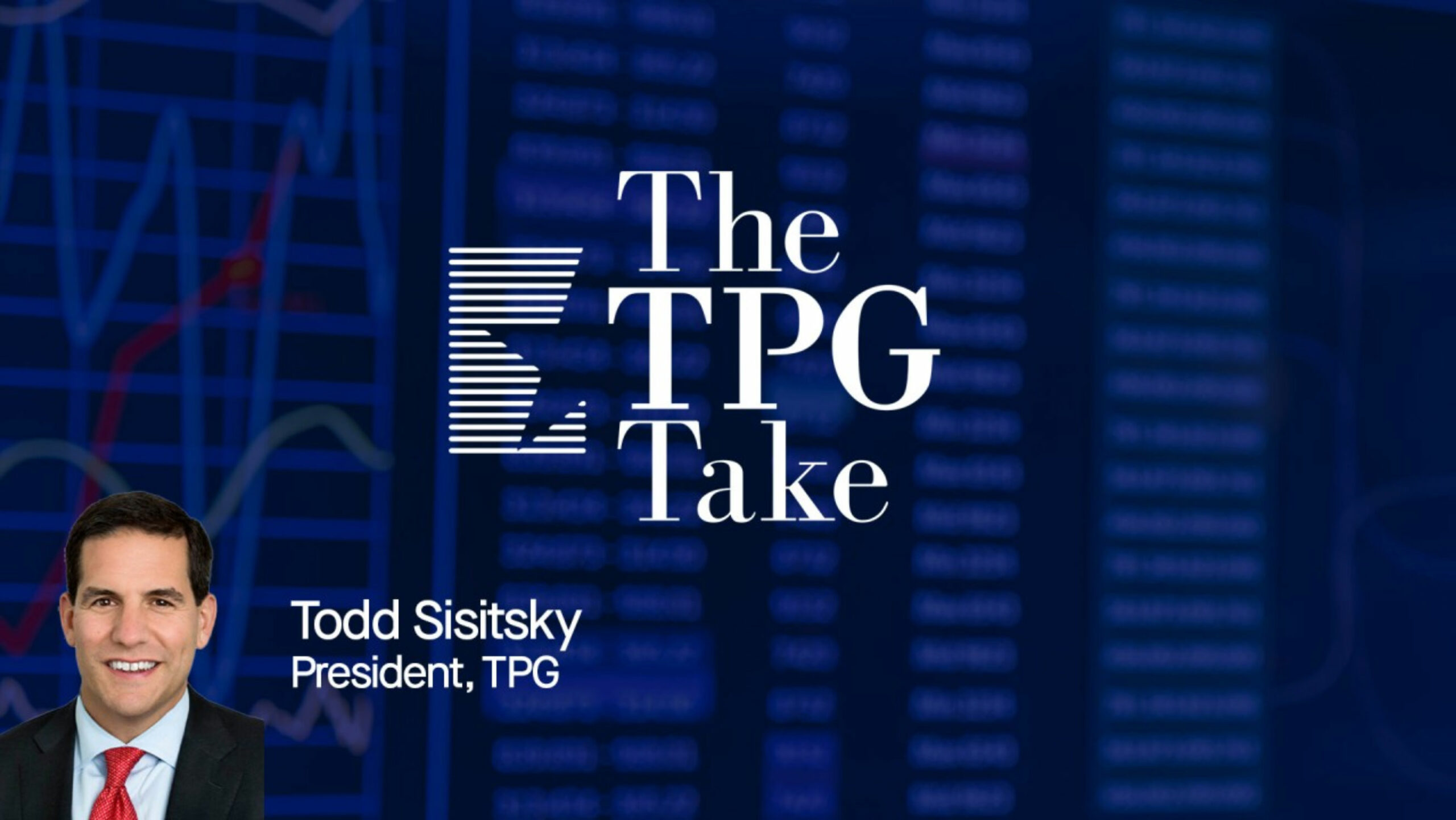
May 2024, Issue #3
Deal Dynamics & The Case for Diversification: TPG President Todd Sisitsky on Mid-Year Macro & the Evolution of Private Equity
In our latest edition of The TPG Take, we sit down with TPG President Todd Sisitsky, who shares his views on the trends shaping the current macro and deal environment, why diversification has been critical to success in alternatives, and how the space has evolved throughout his decades-long career.
On Mid-Year Macro: "I think there are indicators that would point to different directions for the economy and ultimately for the market as well. On the business-to-business side, we've seen resilience in the health care and technology sectors. In health care, there is still a bit of a rebound effect from the COVID period. In technology, we've seen very strong retention rates, particularly in software. Quarter-to-quarter we've seen some slowness in converting pipeline into new customers because people are cautious about making long-term commitments, though we've seen some improvement in that over recent quarters.
The high-end consumer has hung in quite well, but inflation has certainly had a broader impact on the consumer and particularly the lower-end consumer. All of that leads to an environment in which there's a fair amount of muddiness and a lack of clarity around where the economy is headed. For us, that has really led us to be particularly focused on our strategies, on executing our playbook, and sticking to the areas that we know very well and have built up conviction in over multiple years.
There also are areas that we're investing heavily in that are extremely well-positioned from a secular growth perspective - climate being one example. There's such a tremendous need for climate capital across the globe. The needs are not the same in every part of the market. And the public markets are investing behind areas of climate that we think may not be quite as compelling as areas of the private market. So that's another area that, in some respects, is less exposed to the economy by virtue of the dramatic overall needs in that market."
On Deal Dynamics: "One of the things we've been hearing a lot about over the last two years is the dearth of private equity dealmaking. I think ultimately, there are different categories or types of deals. There's a flow part of the market, and that flow part of the market relates to opportunities that are available when multiples appear high, when there's plentiful availability of debt and leverage to facilitate buyouts. In some of those cases, we look at those investments and think of them more as a levered index on an industry than the type of deal that we get more excited about.
The other part of the market is a much more customized and specialized part, which entails sourcing and trying to create opportunities where they might not already exist. In some cases, that results in investments where you don't have a clear seller and a clear buyer, but you have a structured relationship with a corporate to try to achieve mutual goals. That more customized part of the market certainly requires more patience. One of the reasons I think that we as a firm have seen less volatility in our investing activity is that we rely very heavily on this second category."
On the Case for Diversification: "Private equity and alternative assets have undergone tremendous change over the last three decades. As is the case with many industries, as they mature, they become more competitive. The need to continually develop incremental capabilities, the ability to add value to your companies, and the ability to inflect growth are all now very important components of what it means to be an alternative asset firm.
There are several reasons why many of the leaders in alternative assets have continued to diversify their product set. For us, it really comes down to three:
- The power of the IP Ecosystem – The ecosystem that we build in our sectors and in our areas are transferable into other asset classes. As we've expanded our platform, both organically through new product development and also inorganically through acquisitions, we’ve found a tremendous amount of synergies just by leveraging the IP and that sense of conviction that we have in each of these different business areas across the broader platform. It's rewarded and celebrated at TPG, and I think it's one of our strongest competitive advantages.
- Full suite of solutions to LPs – A second reason that diversification is increasingly important is that we have a partnership with our limited partners. That partnership is multifaceted and it typically entails a relationship across multiple asset classes. The LPs, who are very sophisticated counterparties and partners, want to have more concentrated relationships across more products with a core set of GPs. There is a lot of demand for liquidity from LPs. And we've been very focused on not just making investments, but also returning capital. It's increasingly important to be able to offer that diversity of perspective because the relationships exist at every level of the firm.
- Importance of operational scale – The third reason for diversification in growth is that the cost of doing business, whether it's regulatory, the legal and compliance side – the important investments that you make in your client and capital formation groups, which has now gone from being largely pension funds, corporations, and sovereign wealth funds, increasingly to high-net-worth individuals and insurance. It's continuing to evolve. It requires a significant amount of investment and expertise and very tight collaboration between your client facing professionals and investment professional. And for us, it's another reason that I think diversification and growth is an important component of being a successful alternative asset firm."
On the Evolution of Private Equity: "I think private equity has become an increasingly important part of the broader capital markets and I think that's only going to increase. There are a lot of reasons for that. One is the simplicity of the model. By simplicity, it’s certainly a complicated industry. But as a private equity investor, our alignment with our management teams and our alignment with our LPs is very clear. Our ability to focus on a longer time horizon, our ability to impact our investments with that longer time horizon in mind, to think about growth, to think about how to improve the positioning and the competitive strength of the businesses you're invested in at every stage of private equity evolution, I think that the sophistication and the tools that private equity brings to the companies to invest in have improved, have sharpened to become more compelling.
The other aspect of private equity that is compelling, and this is probably more of a recent phenomenon, if you look at how our portfolio has been built, particularly over the last several years, there's an increasing number of situations where we're partnering with corporates. That is something that is relatively new for the industry. If you go back ten years, the top corporates might have looked at private equity as a place to dispose of low-growth, non-core assets. The idea that private equity may be bring solutions-based capital… That is a new phenomenon. Private equity firms are now, I think, being respected as partners who can add value well beyond on the capital that they provide."
In Other News & Views...

We also want to "circle back" to share other recent insights from our ecosystem, senior leaders, and investing professionals that you might have missed.
In our series Partnerships in Focus, we hear directly from leaders across the TPG portfolio and ecosystem. In this episode, CAA President Jim Burtson reflects on our 13-year partnership, which came to an end in September 2023, with the entertainment and sports agency and how we worked together to transform the company amid an ever-changing landscape during what was one of our longest-ever partnerships for the firm.
In our series TPG Rise Climate Conversations, we hear from a number of leaders across the firm and TPG ecosystem on why we launched a dedicated climate investing strategy back in 2021 and how that strategy continues to evolve.
In this episode, TPG Co-Founder, Executive Chairman, and TPG Rise Climate Managing Partner Jim Coulter sits down with TPG Global Head of ESG, Liz Stiverson, to share his perspectives on the evolving climate investing landscape, how TPG Rise Climate approaches that landscape, and the opportunities that lie ahead.
Thank you to all of our followers and readers for joining us for another edition of The TPG Take. Please share the newsletter with anyone you think would be interested and we look forward to being back in your inboxes soon.

TPG
345 California St suite 3300, San Francisco, CA 94104, USA
Important Disclosures
This material is solely for informational purposes and shall not constitute an offer to sell or the solicitation to buy securities. The opinions expressed herein represent the current, good faith personal views of the author(s) at the time of publication, and do not necessarily represent the views of TPG, its affiliates, or any of its investment professionals. The opinions expressed herein are not definitive investment advice and should not be relied on as such. The information presented herein has been developed internally and/or obtained from sources believed to be reliable; however, TPG does not guarantee the accuracy or completeness of such information. We provide links to third party websites only as a convenience and the inclusion of such links does not imply any endorsement, approval, investigation, verification or monitoring by us of any content or information contained within or accessible from the linked sites. If you choose to visit the linked sites you do so at your own risk, and you will be subject to such sites' terms of use and privacy policies, over which TPG has no control. In no event will TPG be responsible for any information or content within the linked sites or your use of the linked sites. Predictions, opinions, and other information contained in this material are subject to change continually and without notice of any kind and may no longer be true after the date indicated. Any forward-looking statements speak only as of the date they are made, and TPG assumes no duty to and does not undertake to update forward-looking statements. Forward-looking statements are subject to numerous assumptions, risks and uncertainties, which change over time. Actual results could differ materially from those anticipated in forward-looking statements.
